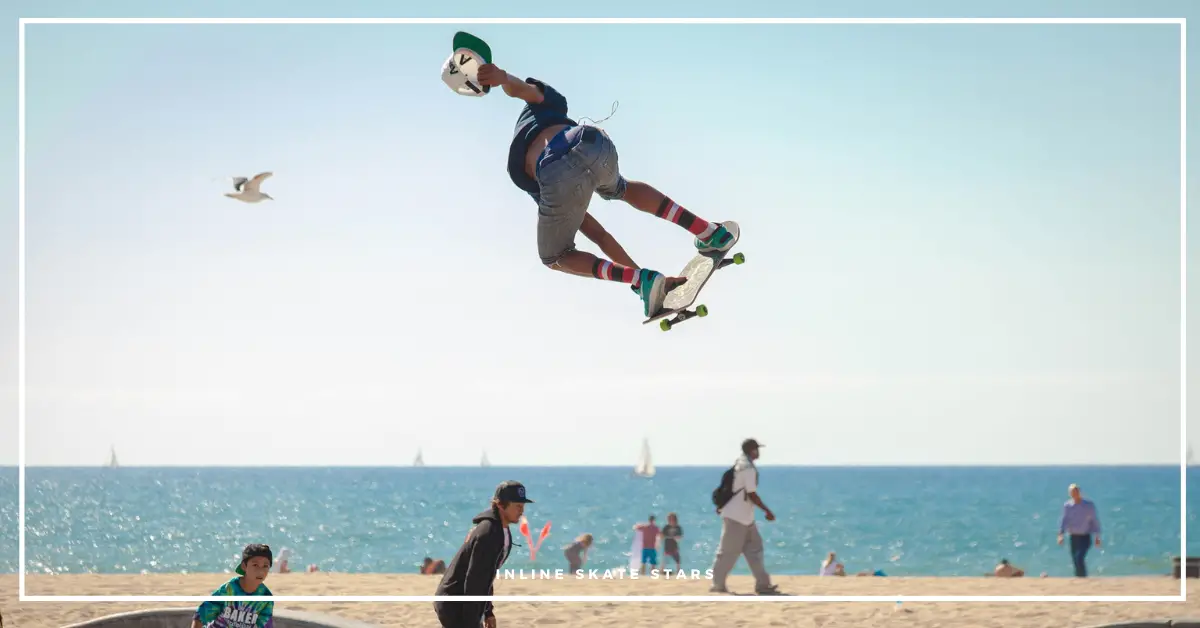Can skateboarding be a career? You probably spend hours perfecting your skating skills like kickflips and ollies, dreaming of a life where skateboarding is your job.
The good news is that today, skateboarding isn’t only a hobby.
It’s now a legitimate career option for skaters with the right skills and dedication.
Studies show professional skateboarders in the US earn approximately $64,168 base salary annually.
But how do you turn your love for skateboarding into a successful career? You’re probably wondering.
I’ve put together this article to show you how to make the most of your passion for skateboarding and turn it into a lucrative career.
Whether you’re a seasoned skater or just starting, this guide will be worth reading. So, let’s get to it!
Can Skateboarding Be a Career?
Can Skateboarding Be a Career? Yes, skateboarding can be a career for many people. Reports confirm professional skateboarders in the US earn approximately $64,168 base salary yearly.
Below I elaborate on how you can participate in professional skateboarding as a career!
1. Professional Skateboarder
Professional skateboarders are athletes who earn a living by competing in skateboarding events, participating in sponsorships, and endorsements.
To become a professional skateboarder, you must join skateboard classes, develop your skills, build a following, and compete in various competitions to gain recognition from sponsors and industry professionals.
- Annual earnings: The earnings of a professional skateboarder can vary widely depending on their level of success, sponsorship deals, and competition winnings. According to Comparably, the average annual salary for a professional skateboarder in the United States is around $64,168.
- What it takes: To become a professional skateboarder, you must have a deep love for skateboarding, dedication, and a strong work ethic. You need to be willing to spend countless hours practicing and honing your skills. Participating in competitions is also crucial to gain recognition and building a following. Building relationships with industry professionals and pursuing sponsorships is essential to make a living as a professional skateboarder.
2. Skateboard Company Owner
Owning a skateboard company requires a deep knowledge of the industry, marketing, and business management.
To start a skateboard company, you must develop a unique brand and product line, build a team of sponsored skateboarders, and create a marketing strategy to promote your products to consumers.
- Annual earnings: The earnings of a skateboard company owner can vary widely depending on the size and success of the company.
- What it takes: To become a skateboard company owner, you need to have a deep understanding of the skateboarding industry, marketing principles, and business management. You must be creative, innovative, and have a strong entrepreneurial spirit. Building a team of sponsored skateboarders, designing a unique product line, and creating a strong brand identity are also essential to the success of a skateboarding company.
3. Skatepark Designer/Builder
Skatepark designers and builders create custom skateparks for communities, schools, and private clients.
They must have a deep knowledge of skateboarding and an understanding of construction and engineering principles to design and build safe and functional skateparks.
- Annual earnings: The earnings of a skatepark designer or builder can vary widely depending on their level of experience, the size and complexity of the projects they work on, and the location of the projects.
- What it takes: To become a skatepark designer or builder, you must have a deep understanding of skateboarding and an eye for design. You also need to have a strong knowledge of construction and engineering principles and the ability to work with a team to bring your designs to life. Building a portfolio of successful projects and networking with industry professionals is also essential to a successful skatepark design and construction career.
4. Skateboarding Event Organizer
Event organizers are critical in planning and executing successful skateboarding competitions and festivals.
They must have strong organizational and marketing skills to attract participants and sponsors, secure venues, and manage logistics.
- Annual earnings: The earnings of a skateboarding event organizer can vary widely depending on the size and success of the events they organize.
- What it takes: To become a skateboarding event organizer, understand the industry and event planning principles. You must be highly organized, detail-oriented, and able to manage multiple tasks simultaneously. You must also have excellent communication and marketing skills to attract participants and sponsors. Building a network of contacts in the skateboarding industry and gaining experience working on events is also crucial to a successful career as a skateboarding event organizer.
5. Skateboarding Coach/Instructor
Skateboarding coaches and instructors help beginners and intermediate skateboarders develop skills and techniques.
They work with individuals or groups to teach basic skills, tricks, and safety measures to improve their performance and confidence.
- Annual earnings: The earnings of a skateboarding coach or instructor can vary widely depending on their level of experience, the number of clients they work with, and the location of their business. According to ZipRecruiter, the average annual salary for a skateboarding coach or instructor in the United States is around $62,863.
- What it takes: To become a skateboarding coach or instructor, you need to have a deep understanding of skateboarding and the ability to teach and communicate effectively with students. You must also have a strong sense of patience, encouragement, and empathy to work with students of all ages and skill levels. Building a reputation as a knowledgeable and effective instructor and marketing your services effectively are also essential to building a successful career as a skateboarding coach.
Skills Required for a Successful Career in Skateboarding?
Here are some essential skills required for a successful career in skateboarding:
- Skateboarding Skills: The most important skill required for a successful career in skateboarding is skateboarding itself. This includes the ability to perform a variety of tricks, jumps, and spins on a skateboard. A skateboarder should understand different types of boards, wheels, and other equipment to maximize their performance.
- Physical Fitness: Skateboarding is incredibly physically demanding and requires excellent coordination, balance, and agility. A skateboarder should be in top physical shape to perform at their best and avoid injuries.
- Creativity: Skateboarding is a creative and expressive sport that allows skateboarders to showcase their unique style and personality. A skateboarder should be able to think outside the box and develop innovative and creative ways to perform tricks and maneuvers.
- Resilience: Skateboarding is a sport that requires a lot of trial and error. A skateboarder should be able to handle setbacks and failures and keep pushing themselves to improve.
- Competitive Spirit: Skateboarding is a highly competitive sport, and skateboarders should strongly desire to compete and win. Skateboarders should have a positive attitude and strong work ethic to continuously improve their skills and performance.
- Marketing and Branding Skills: Skateboarding is about performing tricks, building a brand, and marketing oneself. Skateboarders should have good communication skills and a strong social media presence to promote themselves and their sponsors.
Tips for Starting as a Professional Skateboarder?
Starting as a professional skateboarder can be both exciting and challenging. Here are some tips to help you on your journey:
- Master the basics: Before you can move on to advanced tricks, you need to master the basics of skateboarding. Spend time practicing balance, pushing, and turning until you feel confident on your board.
- Set goals: Setting achievable goals is essential to your success as a professional skateboarder. Start with small goals, such as learning a new trick, and work your way up to larger goals, such as competing in a skateboarding competition.
- Train regularly: Regular practice is crucial in improving your skateboarding skills. Set aside time each day to practice, whether at a skatepark or in your backyard.
- Learn from others: Watch other skateboarders and learn from their techniques. Attend skateboarding events and talk to other skateboarders to learn tips and tricks that can help you improve your skills.
- Stay in shape: Skateboarding requires physical fitness, so staying in shape is essential. Incorporate squats and lunges into your workout routine to improve strength and balance.
- Network: Building relationships with other skateboarders, sponsors, and industry professionals is crucial to your success as a professional skateboarder. Attend events, participate in competitions, and join online skateboarding communities to network with others.
- Be patient: Becoming a professional skateboarder takes time and dedication. Keep going even if progress is slow; keep working hard towards your goals.
Can Skateboarding Be a Career? Frequently Asked Questions
1. How long does it take to become a successful skateboarder?
Becoming a successful skateboarder takes a year to three years of consistent practice.
The first year is when you learn basic tricks, while more advanced maneuvers can take up to three years of dedication and hard work to master.
2. Are there any risks involved in being a successful skateboarder?
Skateboarding carries risks like any other sport. Typical skateboarding injuries include minor scrapes and bruises to more severe injuries like broken bones and head injuries.
Wearing protective gear like helmets, knee and elbow pads, and wrist guards go a long to minimize the risk of injury.
3. Can skateboarding be a full-time career?
Skateboarding can be a full-time career for some people. Successful skateboarders can earn a living through competition winnings, sponsorships, endorsements, and media appearances.
4. Do I need any special training to be a successful skateboarder?
Special training is optional to become a successful skateboarder. While formal training isn’t required to become a successful skateboarder, it can still be beneficial.
Skateboarders can use lessons, clinics, and camps that experienced coaches and professionals offer to improve their skills and technique to become better at their craft.
Importantly, regular practice and dedication are crucial to developing the muscle memory and balance required for success in skateboarding.
Lastly, building strength and flexibility through cross-training and conditioning exercises to minimize the risk of injury and improve overall performance also goes a long way for skateboarders.
Can Skateboarding Be a Career? Wrapping Up
Skateboarding has evolved from a mere hobby to a legitimate career option for talented individuals. With the sport’s growing popularity and the increasing number of sponsorship opportunities, skaters can turn their passion into a sustainable livelihood.
However, it is important to note that pursuing a career in skateboarding requires dedication, perseverance, and a strong work ethic.
While the road to success may be challenging, those who are truly passionate about skateboarding have the potential to carve out a fulfilling and rewarding career in this dynamic and exhilarating industry.


